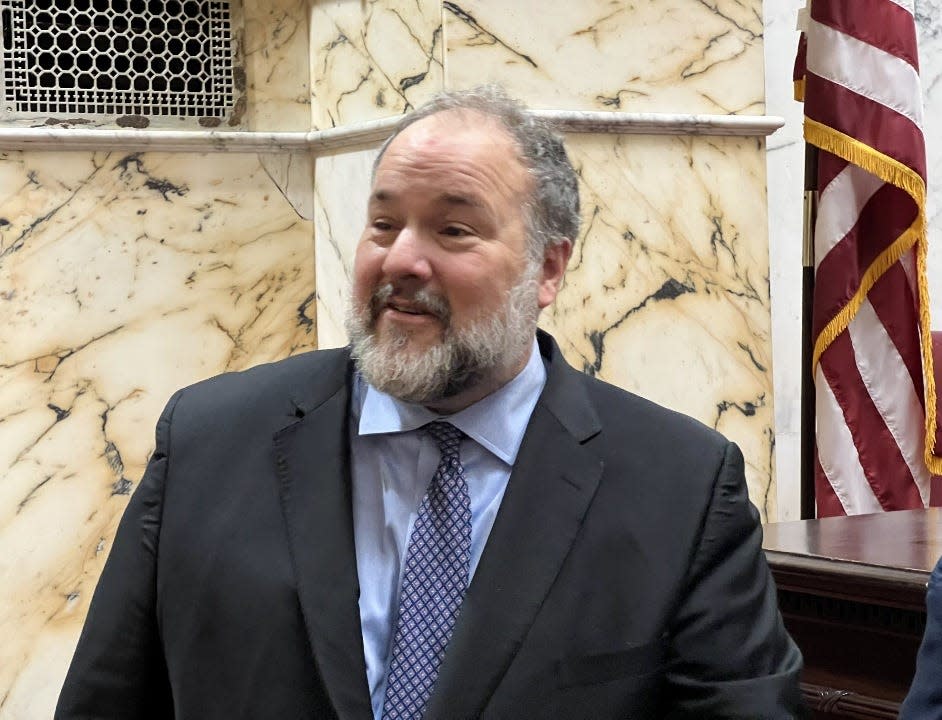Estate notices, key income source for newspapers, may go to state in pending Maryland bill
The legislative process in Maryland does not end when the state lawmakers go home after the frenetic final hours of a 90-day General Assembly session— the legislation that passes both chambers awaits a governor’s decision.
Such is the case for House Bill 1258, legislation that centralizes estate notices in a government website and eliminates the requirement for such notices to be published in a local newspaper, a source of nearly $1.7 million from Maryland estates and for publications in fiscal year 2023.
The legislation did not receive one vote against the bill in either chamber, but after session the governor was sent a letter urging a veto from Rebecca Snyder, the executive director of the regional press association, which counts as members more than 40 Maryland news organizations, including this one. The governor has until May 28, the day required by law, to make a decision about the bill. A governor can either sign it, veto it or let it become law without his signature.

On the state’s Eastern Shore, Keith Ward, the register of wills in Somerset County, where the county motto on the jurisdiction’s seal is “Semper Eadem,” Latin for “Ever the Same,” is waiting. He said he had concern about the legislation at first, especially as residents in the state’s southernmost county lacked internet access.
“Things have changed,” said Ward, in a May 7 phone interview, “and pretty much everywhere geographically does have fairly good service now.”
More: As Maryland expands broadband buildout, low-income internet benefits are disappearing
‘We can provide a better service free of charge,’ bill sponsor says of state
He described the working relationship with the local newspaper, The Crisfield-Somerset County Times, and it’s Delaware-based public notice department, as “fine.”
Ward said the government website, which has been running in conjunction with the notices in the newspaper for a few years now, “can be part of something that helps save constituents money and still get the job done.” In Somerset, it costs over $100 to publish a notice for a “regular estate,” he said. (A “regular estate” notice is one for an estate worth over $50,000, said a chart, sent by Byron Macfarlane, chair of the legislative committee for the state’s registers of wills.)
Cost, too, was on the mind of Del. Elizabeth Embry, D-Baltimore City, who introduced the bill this year after the issue was presented to her before the session by a Maryland register of wills.
“It’s good for Marylanders,” said Embry, of the legislation, in a May 7 phone interview, “and of course, it’s a way to save people money.”
She noted no one signed up to testify in opposition at the bill hearing, held in February. “The legislative process is the place where things may be aired out,” she said.

More: Maryland lawmakers launch effort to aid workers impacted by Baltimore bridge collapse
Asked about concerns that the legislation could diminish the news industry, Embry said: “I certainly care deeply about journalism,” noting her local news subscription, “This (publication requirement) is basically a fee imposed on Marylanders that we don’t need to impose, and we can provide a better service free of charge.”
Several county registers of wills, to include Washington and Wicomico counties, whose testimony to legislative committees was included as attachments in an email sent by Macfarlane, the Howard County Register of Wills, noted the problems with notices and their publication, including delays, errors in the notices such as misspelling, and problematic payment processing.
Fourth Estate, press association concerns laid out in letter to the governor
Snyder, the executive director of the Maryland-Delaware-DC Press Association, sought to make the connection between the legislation and the news business in an April 12 letter to Maryland Gov. Wes Moore, a Democrat, four days after the adjournment of the General Assembly on April 8 and the state Senate’s passage of the legislation in a late night proceeding earlier that same day.
“The cost to local businesses (newspapers) is significant and will have a direct impact on reporting positions,” she said. “Some publications may merge with others; some may go out of business.”
Her letter to the governor comes about six months after a Northwestern University report showed 130 newspaper closings or mergers across the nation last year, leaving more than 200 counties nationwide as “news deserts,” meaning they have no or very limited access to local news.
More: ‘The 2024 Legislative Session will never be eclipsed': Lawmakers wrap up for year
In his written testimony before the Senate’s Judicial Proceedings Committee in March, Macfarlane acknowledged the state of the news industry in Maryland and its effect on the state.
“In recent years, local newspapers have either been shuttered or consolidated by out-of-state corporate conglomerates,” he said. “The unpredictable future of this industry puts the Registers, meaning the state, in an unsustainably precarious position with no long-term assurances.”
The situation in Maryland’s southernmost jurisdiction, Somerset County
Back in Somerset, known in part for the Ward brothers and their decorative bird carvings, the local register of wills, also named Ward (but apparently of no relation), said the local paper means a lot to the community.
“We’ve always loved the County Times,” said Ward, mentioning by first name a journalist that has been with the local paper since 2006. (The County Times is no relation to the Daily Times, a publication owned by Gannett Co., Inc., which also owns this paper, the Herald-Mail, based in Washington County's Hagerstown.)
Ward feels confident his office would be able to implement the new legislation, if enacted. “We have been doing both now for over two years,” said Ward, referencing the online and newspaper notices.
Finding info on down ballot races: Maryland primary election: How to find out information about local down ballot candidates
Asked how the public would be informed that the notices would no longer be printed in the paper, if the legislation is enacted, Ward paused. He then mentioned phone calls and "word of mouth."
“In all honesty,” he said, “I was considering myself writing, having an ad for the first few weeks, still placed in the local County Times on how to access the website and the new publications and notices on there.”
A request for comment on the legislation sent to the governor’s office was not responded to by the time of filing.
Dwight A. Weingarten is an investigative reporter, covering the Maryland State House and state issues. He can be reached at dweingarten@gannett.com or on Twitter at @DwightWeingart2.
This article originally appeared on Salisbury Daily Times: Estate notices may no longer be printed in newspapers. What to know.
